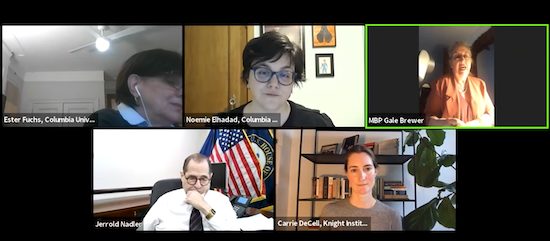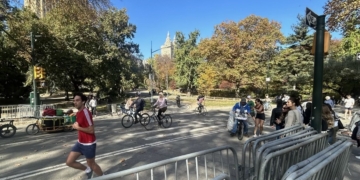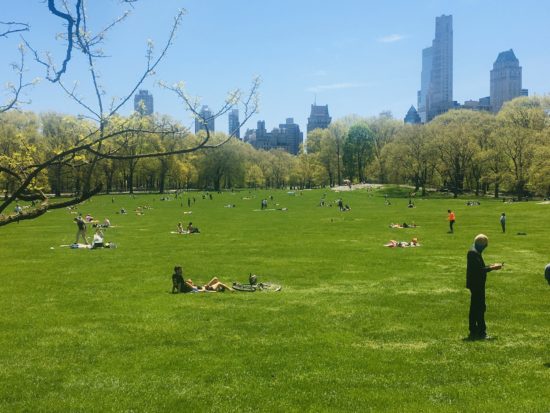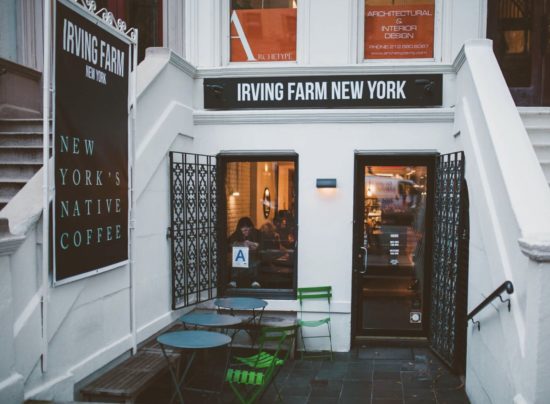
A Zoom screen from the meeting.
By Renée Roden
A key part of reopening New York City will be isolating people who have coronavirus, and keeping it from spreading in larger clusters. Key to that is a process called contact tracing.
On Tuesday, Columbia University held a digital panel on “Contact Tracing and Technology: Balancing Public Health and Privacy”as part of its Neighbors initiative. The Zoom meeting was streamed live on YouTube and the recording can be found there and on the Columbia Neighbors website.
Manhattan Borough President Gale Brewer moderated the panel composed of Ester Fuchs, Director of the Urban and Social Policy Program at Columbia University; Noémie Elhadad, Associate Professor of Biomedical Informatics at Columbia; Carrie DeCell, staff attorney at Columbia University’s Knight First Amendment Institute, and Congressman Jerry Nadler.
According to YouTube, 114 viewers tuned into the live-stream.
Contact Tracing: What is It?
Contact tracing is a means of gathering public health data from communities of infected people and people at risk of infection by tracing the people with whom an infected person may have had contact.
There are two essential components to contact tracing—human contact tracers who can interview and meet with individuals and the technological tools that assist human contact tracers in gathering data.
New York City and New York State are hiring contact tracers to interview those who have been infected by COVID-19, and to help inform people who have come in contact with them that they are at risk.
Contact tracing is a more targeted strategy to stop the spread than lockdowns. Along with testing, contact tracing is one of the programs that can allow states to move out of lockdown safely into more controlled mobility.
Types of Contact Tracing
Contact tracing depends, first and foremost, on human labor. Johns Hopkins University Hospitals are running the training courses for these contact tracers in New York City and New York state.
In New York, at the time of the meeting, over 7,000 people have applied for 1,000 contact tracer positions. But according to Congressman Nadler, we need more. “If you’re going to do this right, you’re going to need 400,000 to half a million people working full-time in contact tracing,” said Nadler.
Technology companies are building tech tools that can help human contact tracers gather and manage the large amounts of data that will be needed to create public health policies and enforce targeted quarantines. Dr. Elhadad emphasized that technology works best as a complement to human tracers.
Important Data
Noémie Elhadad said contact tracing provides geographic information that can locate the current COVID-19 hotspots and identify the next potential outbreak of the pandemic.
Contact tracing also provides aggregate data that can help officials understand whether social distancing measures are working in a neighborhood. Are there cultural or systemic barriers that are preventing the successful implementation of social distancing?
How can the government protect our privacy?
This question of privacy was clearly on the mind of those who submitted questions, and of those who commented on the YouTube live stream. A question fielded by Gale Brewer asked how to ensure contact tracing does not become a policy like “stop and frisk” that discriminates against a certain population.
Carrie DeCell said that the first question must be posed to public health officials to clarify the information they need “to effectively trace the coronavirus [and] limit that spread.” Asking public health officials to clearly define the information that is necessary to do their work helps lawmakers write legislation that gives the government narrow surveillance powers over citizens.
The role of Congress, said Congressman Nadler, is to monitor new technologies “so that they cannot be used and are not used for invading privacy.”
The panelists offered several guidelines for making sure that data gathered from contact tracing could not be abused by the government.
Anonymize and Protect Data
Nadler applauded the work of technology companies racing to offer solutions to public health organizations. But, he cautioned, “We must be vigilant to ensure that we don’t throw open the doors to new big data programs that would compromise Americans’ privacy or be used to discriminate against the most vulnerable groups.”
“None of these technologies should be used to create new government surveillance programs,” said Nadler. Furthermore, he insisted that any information gathered about a person through COVID-19 programs “should be anonymized.” And, finally, no one’s data should be used beyond the express purpose of public health. These databases accumulated during this national emergency should be “purged” when it is safe to do so, Nadler recommended.
DeCell emphasized that data collected in contact tracing needed to be anonymized so that the government could not identify a person through public health data.
She also recommended public health data be stored on someone’s phone locally rather than in a centralized government server or other remote server, “so that it doesn’t become part of a giant government stockpile that may be put to different purposes down the line.”
Proximity vs. Location
Carrie DeCell noted that one of the most common forms of technology being explored in digital contact tracing is Bluetooth technology, which would be used as a way of recording what other phones that a person’s cell phone came into contact with.
Bluetooth data is more secure and focused than location data, which has been used around the world. “Location data can reveal much more information about a person that is much less relevant for public health purposes,” said DeCell. Where a person is and why they’re there is not as important for public health as the people whom the person is around. “We have to “make sure the data that is being collected is the data most relevant for public health purposes,” said DeCell.
Community-Sourced Data
Dr. Fuchs emphasized the importance of communities banding together to create their data. She and Dr. Elhadad have worked together on COVIDWatcher, an example of what she called “citizen science.”
COVIDWatcher, an initiative of Columbia University spearheaded by Dr. Fuchs and Dr. Elhadad, uses community-sourced data to help the local community “prioritize the issues that matter most during the pandemic and beyond.”
According to Dr. Fuchs, COVIDWatcher’s data is stored on HIPAA-certified servers and, if the participant chooses to provide identifying information, it is stored on a separate server.
Aggregate data, like COVIDWatcher gives policymakers and public officials data about communities and demographic groups, but does not endanger individuals’ privacy.
Find Positive Uses of Data
The panelists were divided on whether the data gathered through contact tracing could be used in a positive way to help with systemic issues beyond COVID-19.
Borough President Brewer noted that collecting data can help interagency communication and help agencies function more effectively together.
DeCell and Nadler were more skeptical of the potential for data to be misused. “I would push back on the urge to repurpose this data for any other—even beneficial—use going forward,” DeCell said.
Curious community members brought up the question of data ownership. “Can individuals ‘own’ their data, can they be compensated for its use?” one commenter asked.
Fuchs said that community-based clouds were one of the safest forms of data—and communities could sell it or monetize that data for their own purposes. Members of the community-based cloud still owned their data and simply sold it.
Our data is being sold by tech companies all the time, said Dr. Fuchs. It’s not outlandish to imagine getting a small cut of the profits.









I want to start by saying I am an advance practice Nurse whom has had to work outside of my home as usual. I do not have a good feeling about the government and non health care workers handling my health care data. Not sure how they are going to get around HIPAA on this one. Electronic tracking and other forms of data collection on individuals health and daily location is something you would see in China and North Korea which i have a feeling our local politicians like those models.
Effective close contact tracing or all your privacy, pick one.
You should carefully read the documentation on the API that google and apple came up with… this is exactly the kinds of data that greatly facilitates contact tracing.
They would trace you with your phone so not so anonymous. If your phone is on airplane mode or you do not have one then this would not work. I for one keep my phone off unless making calls (I am not one of those people with phone stuck to ear) So for folks like me no trace.
I am not sure if the panel / Zoom meeting was intentionally vague or maybe this article is just not well written/reported, but I have absolutely zero idea after reading this what they intend to do to contact trace.
It’s not clear how contact tracing can work without *universal* use of tracking technology. IMO that will not happen in the USA. Partial implementation may slow the course of the virus, but will not end it completely, so the virus will continue to run its course – for months, for years – until herd immunity is achieved after *most of us* have been infected.
A couple of months ago the powers-that-be insisted that “flattening the curve” and having ample hospital resources (beds, ventilators, etc) were the prime criteria for ending the quarantine and reopening. That has occurred. Using tracing data is all well and good but the goalposts need to stop moving. It’s time to start reopening society, slowly and carefully.
The Health Department has run contact tracing programs for a century–from TB to polio to HIV to STDs and more with responsible attention to confidentiality. Suddenly it is with HHC that never did that and is fully occupied with treatment and corporate America that surely are likely to violate public protocol. I wonder if there is a plausible justification for changing experts in this cris
Don’t believe for a moment that government over time won’t continue to tighten the reigns. I say No to any contact tracing. I just read a Mercola article dated 5/15/20 “Contact Tracing Apps Violate Privacy” The talking points are: The Rockefeller Foundation’s white paper, “National COVID-19 Testing Action Plan” lays out a strategic framework that is clearly intended to become part of a permanent surveillance and social control structure that severely limits personal liberty and freedom of choice
Contact-tracing apps are a significant part of this scheme, and the Rockefeller plan clearly states that “Whenever and wherever possible data should be open,” and that “privacy concerns must be set aside”
The U.S. is rapidly adopting an artificial intelligence-driven mass surveillance system rivaling that of China, and legal and structural obstacles are being swept away under the guise of combating COVID-19.
Contact-tracing apps require you to keep your cellphone on your person throughout the day, giving thousands of third parties access to personal data.
Privacy protects people from interference, intervention and manipulation, and must be protected at all costs
I always look to NYC hero Jerry Nadler for expert medical advice. He’s a role model for sure!
Yes he hits the gym several times a week and watches his diet. We need to all follow his directions and food plan
I don’t understand your comment